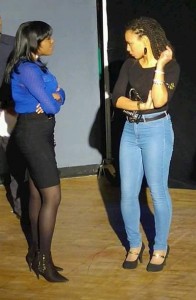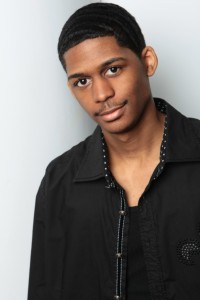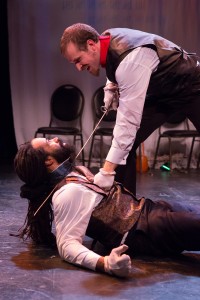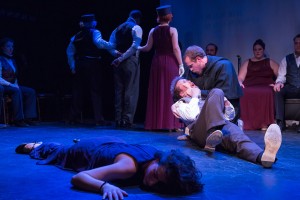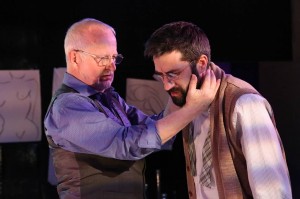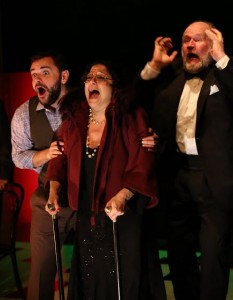You may remember Soho Playhouse before the pandemic. Located in an antebellum row house just off Sixth Avenue, it often featured solo and Fringe Festival plays in its careworn mainstage theater or cabaret downstairs, its stairwell adorned with framed posters of shows that had played there.
Nothing But the Truth
Why Not Just Tell the Truth is an ambitious, yet over-reaching, play at The Tato Laviera Theatre. It is extremely current and very raw, with great music selection for a television show. Based on a web series, of the same name, it brought the challenges of the average TV show to the stage; the need for a talented script doctor and a seasoned director. The play desperately wants to be edgy, however what’s missing is an understanding of theatrical character development, voice projection and pacing. The playwright offers 25 separate scenes in three acts, and as he explains before the current rises, the play is in your face; however it lacks the tightness cinema may forgive but the stage demands.
Written, co-directed and produced by Carleton King, who also plays the lead, Why Not Just Tell The Truth is challenged by King assuming too many duties. His character is on stage for most scenes, never allowing him the latitude to tighten the script or deliver deeper, richer characters. As an actor, King’s vision for the role of Jason requires a deeper, spiritual quest (especially as he argues with God). Throw the Bible on the ground but make it matter. The audience is afforded less time with the characters enduring long scene changes that soften the impact of drama
As a teenager, Jason inherited an extremely large sum of money from his parents. He has been married for two years to a woman who verbally taunts him all the while cheating on him. After finally separating, she is physically abused by her new boyfriend, ridiculed by Jason’s new female companion who proclaims herself a “high-powered attorney” and eventually returns to Jason longing for whatever it is she thinks they had. While Jason has no desire to take her back, her new boyfriend, who is unhappy with her departure, exacts his revenge but on the wrong person. Jason’s best friend Tony struggles with the transition from the dating scene to a more serious relationship, having perfected the persona of a player. Jason’s childhood sweetheart-turned-mafia "hybrid princess" is still longing for a relationship with Jason knowing that his wife is not good for him. Tony, returning from the dead to offer Jason advice, comes off as a cliché rather than sage closure for the character.
The young actors, who anxiously want to do a respectable job delivering every line, lacked exciting direction with a script that includes a lot of story but provides little room for character nuance. Rarely does co-directing enhance the result and in this case merely muddies the result. Why Not Just Tell The Truth is co-directed by Melissa Diaz. Repeatedly, dialogue is swallowed making scenes difficult to understand, and in almost in every scene someone is outside of the pool of light. The lighting technician, Hector Orta, chose not to light stage right but rather use a wide follow spot. A more seasoned director would have caused the actors to deliver more than just basic emotions, while addressing the most important need of an audience—the desire to care.
The Tato Laviera Theatre is a great space with stadium seating, a large stage to work with and an awesome light board. The main set includes a sofa, end table and a Queen Anne, high back chair, and stage left, which is Tony’s bedroom, has a single bed pushed up against the wall. Stage right starts off empty; however throughout the evening, two chairs and a table are noisily moved on and off set. Since most of the scenes that take place in this part of the stage utilize the table and chairs, it would have been simpler to work around them and light the area appropriately. Additionally, stagehands are too often seen, voices are heard from back stage and lighting, and music cues are missed.
Why Not Just Tell The Truth does not have that luxury of a boom mic or editing room. The musical selections are well chosen for a TV show or movie, but on stage, it fragments the story rather than bring it together. The bones of the play—love, betrayal, revenge and forgiveness—are spoken about but without deeper development of the characters, believability has to be suspended leaving little truth to tell.
Performances of Why Not Just Tell The Truth, produced by Tru Luv Entertainment, run on Friday, Feb. 19 at 5 p.m. and 7:30 p.m. at The Tato Laviera Theatre (240 East 123rd St. between 2nd and 3rd Aves.) in Manhattan. Tickets are $25 and can be purchased by visiting https://www.eventbrite.com/e/why-not-just-tell-the-truth-the-play-tickets-19703885853.
Read our Q&A interview with Carleton King on his inspiration behind Why Not Just Tell The Truth.
Q&A: King Brings Web Series to Theater
Carleton King grew up in Brooklyn, had head shots as an infant and was pushed toward the profession by his parents. Even so, he always knew he had a knack and evolved with the craft by studying acting and theater at St. John's University and Long Island University. After a number of acting credits over the last decade in theater, film and TV, King developed the web series Why Not Just Tell The Truth. With a few thousand subscribers across the globe, King has decided to go Off-Broadway to gauge whether he should add to the 11 episodes already in the can. Either way, coming clean is at the heart of his inspiration.
Carleton King: Honesty is a very deep rooted idea. Most people hate to be lied to but sometimes we even lie to ourselves. This can leave you in a lot of trouble when you’re in denial or being dishonest in interpersonal relationships. So I wanted to explore some of those situations.
OffOffOnline: Taking a look at some of the episodes, I see characters with some heavy weaponry and situations that go on beyond just lying to your girlfriend.
Carleton King: Yes, some of the characters allow certain situations to become bigger than normal life and stem mostly from Tracey (Ana Araújo). Her father was a mafia boss, and her mother comes from a Cuban crime family. That causes her to have this weird dichotomy of a personality, but her friendship with Jason helps drive the plot. So anyone who disrespects him has to worry about her coming after them.
OffOffOnline: Jason is your character. Tell me about him.
Carleton King: He’s a good guy. He believes in love, marriage and making things work. That can work to his detriment because he’ll try to make a bad thing work when he probably just needs to let it go.
OffOffOnline: I guess that includes his marriage.
Carleton King: I’ll just say it. Kathy (Charese Annel) is a bitch. He got his heart broken in college by Janette (Margaret McDuffy and Inayah Burton). She was the one that got away and this left a lingering hole in his heart. Unfortunately, he ends up filling it with the wrong person.
OffOffOnline: Denial—if you will?
Carleton King: Yes… She is evil but hopefully people get to understand what makes her the way she is.
OffOffOnline: She sounds more suited to Tony, the player.
Carleton King: He’s in denial in the sense that he doesn’t want a real relationship or love.
OffOffOnline: Why?
Carleton King: All the characters have their face value and their underlying value. In other words, the things that make them what they are. He’s in denial in the sense that he doesn’t want a real relationship or love.Tony (Patrick Jackson) has all these women, and it’s so easy for him. But why does he chase love like that? We just hope people can come to understand what makes a player a player.
OffOffOnline: How much does Jason relate to your life?
Carleton King: If you know my life, you really wouldn’t get the correlation. But a lot of the situations were inspired by the feelings that these scenes are based on. So if you follow the emotions, then you get the idea where the inspiration comes from.
OffOffOnline: How much is New York City a character?
Carleton King: This play could take place anywhere but it does come into play in the background of the characters. Mariah (Janelle Stein) is a reformed hood girl from the projects. That’s a very specific thing because projects in other cities are not the same. The ethnic mix in New York is also different. So the intermingling in our melting point is inherently different and represents itself in the characters.
OffOffOnline: Are you using the same actors from the series?
Carleton King: Except for me, it’s a whole new cast.
OffOffOnline: What was it like converting from the web to a play?
Carleton King: You don’t have the magic of editing and multiple takes. Then we had to break things down to their basic level and rearrange to fit a more natural order so they flow better.
OffOffOnline: What will be the impact of doing this live?
Carleton King: There’s so many things that I put into the show—it wouldn’t be the same if I tried to record it. The scenes had to be done right there in front of an audience because it’s more of an interactive thing… I’ll just say I plan to raise a few eyebrows.
OffOffOnline: What do you hope people take away?
Carleton King: The truth can be a very powerful thing that shouldn’t be lost in translation, and hopefully people can have the courage to be honest in the first place.
Performances of Why Not Just Tell The Truth run on Friday, Feb. 19 at 5 p.m. and 7:30 p.m. at The Tato Laviera Theatre (240 East 123rd St. between 2nd and 3rd Aves.) in Manhattan. Tickets are $25 and can be purchased by visiting https://www.eventbrite.com/e/why-not-just-tell-the-truth-the-play-tickets-19703885853.
Stand-Up Presidential Campaign
Filibusted, a comic review of the current presidential campaign, is the brainchild of producing artistic director of the Phoenix Theatre Ensemble, Craig Smith, who approached stand-up comic, Al Pagano, with the suggestion of an hour-long burlesque on the national free-for-all into which the sacred task of electing the next leader of the free world has devolved. If this campaign is notable for a public that looks to outlier candidates not beholden to big money and who tell it like it is, what better way to cut through the bombast, double talk, pomposity, dogma, pretentiousness and, yes, lies, than with the gentle and not so gentle barbs of humor.
Written and performed with enthusiasm by Al Pagano and Amy Loughead, Filibusted is a reference to the perfectly legal stymying of the legislative process in the Senate with endless babble; and clearly a comment on the vociferous if also loud and meandering voices in a field of presidential hopefuls who compete mercilessly for our attention as we stumble forward in our selection of a president. It is we voters who are “filibusted” in the process, Pagano and Loughead point out. Hence the brilliant and eye-opening decision of Pagano to allow the candidates to speak for themselves, as Pagano tells us at the very outset:
“Now the reason we aren’t just jumping right into the show is that we want you to know that most of the words this evening which are attributed to the candidates are actually the candidates’ own.” Yes, let ‘em hang themselves on ropes of their own fashioning! “We didn’t change, alter or manipulate much of what they said in any way... we just took their words (out of context) and like pieces of a puzzle, inserted them into scenes of our imagining, to serve our own ends.”
Just as a surgeon might cover all of the body save the segment to which she will apply her knife, Pagano and Loughead thus manage to isolate comments by our candidates, the better to hold them up for all to view and dissect. All of this is wrapped, we are told, in “a series of scenes, sketches and games,” and here begins the fun. Between opening and closing salvos (Sarah Palin and Hillary Clinton), we will hear candidates opine on topics such as flirting (“All the women on 'The Apprentice' flirted with me, consciously or unconsciously. It’s to be expected," says Donald Trump), prenuptials, safe sex (“I’m not sure we need a half a billion dollars for women’s health issues,” says Jeb Bush), staying in shape and threesomes. We will be treated to an imagined Schwarzenegger riff on amending the constitution to allow him to enter the field of candidates and listen to the privileged power brokers of our time cravenly compete in a “race to the bottom” of their hard luck stories to suggest to voters that they are who they are not: just ordinary Joes scrambling for a living like you and me (“My school had these popcorn balls ad they looked really good. But they were a nickel. I never had a popcorn ball,” says Ben Carson).
The estimable surgeon Carson is given a sketch of his own, the better to highlight such statements as “A lot of people who go into prison straight and when they come out, they’re gay, so did something happen while they were in there?” And he asks, “How about we have a transgender bathroom? It’s not fair for them to make everybody else uncomfortable.” Although clearly a man of enormous experience in his chosen field, he alludes to the fact that he has never held office noting that, “every signer of the Declaration of Independence had no federal elected office experience.”
Stand-up includes gesture along with the written word to make its point and the exaggerations of mime in capturing the candidates was especially illuminating. Perhaps the most inspired sketch was the one called “Immigration Game” in which the audience is treated to a panorama of comments over centuries on immigration and quizzed, in multiple choice format, as to the author of the quote—present candidate or figures from the past. But better not to give away the store and leave the leavening and illumination of this sketch to the occasion of your attendance at this engaging and witty performance.
Filibusted's last performance is at 10 p.m. on Feb. 13 at The Wild Project (195 East 3rd St. between Avenue A and B) in Manhattan. Tickets are $20 and include one drink. For tickets, call 212-352-3101 or visit http://www.phoenixtheatreensemble.org/filibusted/.
Not Just Another Sandwich...
Currently playing at Urban Stages is the latest adaptation and world premiere of Monte Cristo by Jared Reinmuth based on The Count of Monte Cristo by Alexandre Dumas. An extraordinary cast of 13 who rarely, if ever, leave the stage deliver betrayal, lust, greed, power, and most of all, revenge. The director, Cailin Heffernan, utilizing a small space, keenly chose to keep the actors on stage as witnesses to each scene, as well as part of the scene. Ever present and always attentive, the actors pose, mimic and mime the action, create sound effects, and play musical instruments, including Spanish guitar and a drum called a djembe, while awaiting their turns in Dantes’ game of revenge chess. All these elements make the main dialogue even more compelling.
The story of Dumas’ 1844 classic is a familiar one. On the eve of Dantes’ (Tom Frank) wedding to young Mercédès (Kate Kenney), he is betrayed by three friends who devise a plot that labels him a betrayer of the crown. Imprisoned for 14 years, Dantes learns of the treasure of Monte Cristo, escapes from his captors, finds the treasure and returns to society taking on the persona of Count Monte Cristo. With wealth supporting him, he exacts revenge on his three false friends—one of whom, Mondego (Carsey Walker Jr.) has married Mercédès; they have one son, Albert (Brett Benowitz).
The plot takes place in the prison at Chateau d’If, in Rome during Carnival, and lastly, in Paris. What ties this current production by New Light Theater Project together so well, besides the multitalented cast, is original music by Henry Aronson, the film visuals created by Dedalus 7 projected onto the backdrop, dialect coaching from Theresa McElwee and superb fight direction by Dan Renkin. The lighting, by Michael O’Connor, is subtle and moody, bringing to life the simple yet creative set design by Sarah Lambert. Etched into the side walls are hash marks to count the number of days Dantes is in prison along with the phrase, “My God, let me keep my memory!”
Costume design by Cheryl McCarron consists of floor length dresses for the women, each in a different hue, while the men sport brocade vests with colored cravats. Monte Cristo is in a three-piece contemporary tux with a red cravat, which appears a little out of keeping with the period, but he wears it well. McCarron enhanced the costuming with colorful feathered masks for the Carnival in Rome, white gloves for the Parisian cocktail party and rough-hewn shawls for the men in prison. Overall, the costuming is extremely appealing.
Heffernan has molded her actors into an effective ensemble. Keeping track of the characters, each playing multiple roles with different accents, is challenging to watch at times, making it difficult to single out any actor. As a large, tight ensemble piece, each actor plays very well off the other as scenes meld seamlessly from one to another. The subtleties required to not just be present to what is happening center stage but to enhance it with sound effects and mime makes each actor an integral participant.
Frank’s portrayal as Monte Cristo is charismatic and engaging even as he manipulates his betrayers Fernand (Carsey Walker Jr.), Danglars (Vinnie Penna) and Villefort (Paul Sheehan). The young Mercédès, Kate Kenney, is bright and radiant. In an unusual scene at the wedding ceremony, Kenney dances with Mondego and they include Alana Barrett-Adkins, who then is "handed off" to portray the married Mercédès. Delivering rich performances are Liliane Klein as Mme Danglars and Margherita Peluso who played Mme de Villefort and La Carconte.
From the opening processional to the final shot, this is a vibrant production with a dedicated and talented cast. Revenge, in any century, may be sweet; however, the ensemble of Monte Cristo is rich with talent and proves it.
The New Light Theater Project's production of Monte Cristo runs through Feb. 13 at Urban Stages (259 West 30th St. between 7th and 8th Aves.) in Manhattan. performances are Thursday-Saturday at 8 p.m. Tickets range from $10-$15 and can be purchased by calling 630-632-1459 or visiting BrownPaperTickets.com.
American Kitchen Sink
The characters in Utility, Emily Schwend’s drably titled but fascinating new kitchen-sink drama at the Rattlestick Playwrights Theater, belong to a social milieu that seldom appears on the American stage. They’re working-class folks in the lower socioeconomic spectrum. An offer of coffee means heating a mug of water in the microwave and mixing instant powder into it. Work constitutes holding down more than one shift at a time or just picking up shifts sporadically. Dinner, often as not, is reheated leftovers.
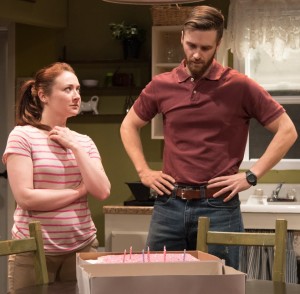
The play opens on a porch in east Texas, where Chris, a guy who has recovered from a pill addiction, is trying to wheedle Amber, his wife, into letting him move back in, just to help with the kids. Chris (James Kautz) has been sleeping on a sofa at his older brother Jim’s place, but Amber (Vanessa Vache) is reluctant to let him come back home. In this short prologue, Schwend lets us know further that Chris has cheated on Amber in the past, with someone at work; that he has a daughter, not by her, who is living with her mother; and that Amber is organized and self-sufficient and probably doesn’t need Chris’s supplementary income, even though her finances are stretched thin.
The focal point of the drama is a birthday party for Amber’s daughter, Janie. (Although the children are never seen, Kate Noll’s deft kitchen design reminds us of their presence: there are children’s drawings under magnets on the refrigerator.) Chris isn’t the child’s father—children with various parents are part of the fabric of this social stratum—but is helping to coordinate the birthday, which puts him in good stead with Amber’s mother, Laura (Melissa Hurst), who proves an unlikely champion for Chris.
“All I know,” says Laura, “is I seen Chris running around here all day long fixing up this house for a birthday party for a girl ain’t even his own daughter.” But, Amber is on top of school, doctors, and box lunches, and responds, “It’s not like it’s just suddenly easier with him here. I’m the one got two jobs, and he’s still another mouth to feed. Another person in the bathroom in the morning. And in and out of work. Can’t send a check when he says he gonna send a check… And actually? It’s easier when I don’t gotta think about him.” In these passages, Schwend displays a gift for dialogue to convey information and attitudes of her characters.
Meanwhile, Jim (Alex Grubbs) is working on restoring Amber’s house, which has apparently been damaged by flooding. He’s in and out of the building, and his presence irritates Amber even though he’s doing the work gratis. He doesn’t get much sympathy from Laura either; she has only a cold shoulder for him.
Director Jay Stull keeps tension in the action and yet lets the strands of Schwend’s drama play out, sometimes just a bit sluggishly, and at others in a pleasantly leisurely way—there’s a late scene that is daringly silent for a considerable stretch while Amber just smokes. His cast is superb. Vache is a grounded, skeptical Amber, a woman perhaps too easily irritable, but also hurt once too often by Chris. She is a formidable protagonist. Kautz finds in Chris an easygoing decency; whatever his past has been, he has left it behind, but he is also not a fully operational adult. The play’s title comes from the utility bill he has forgotten to put money down on—paying it all would be too much for this family—and the power suddenly goes off the day before the birthday party. Hurst’s Laura is also a bit of a strain for Amber; what help she offers comes with opinions, not just about Chris and Jim, but about the danger of vaccines, for instance; at the same time, she has money she has put by and is willing to lend if needed.
Finally, Grubbs as Jim gives a marvelous performance: laconic, grounded and probably in love with Amber. He finds comedy in the deadpan character, and in the comparatively brief amounts of dialogue he is given he manages to convey decency, yearning and self-restraint. The word, “utility,” carries a double meaning of electrical power and “usefulness.” In that sense, the title is apt because the work serves as a useful calling card for Schwend’s dramatic talents as well as the cast’s.
The Amoralists’ production of Utility plays through Feb. 20 at the Rattlestick Playwrights Theater (224 Waverly Place between West 11th and Perry Sts.) in Manhattan. Performances are Thursday-Saturday at 8 p.m., with a special Wednesday evening performance on Feb. 17, and a 3 p.m. matinee on Feb. 14. Tickets are $18 and may be purchased by calling 866-811-4111 or visiting https://web.ovationtix.com/trs/pr/953828.
Payment of Revenge
In this world, it seems everyone is indebted to someone for something; a job, a simple favor or an important introduction. The grateful understand this and are appreciative, often "paying it forward." However, not everyone who goes out of his or her way for another does so with a kind heart. Generosity of spirit may be misread, or at other times, the creditor plans to collect somewhere, sometime. The central theme of Creditors, written by Swedish playwright August Strindberg, weaves a demanding tale of love—controlling love and abandoned love—and, unfortunately, exacting revenge as when the creditor makes a well-planned and malicious visit. Creditors is currently playing at The Wild Project through Feb.14 and is presented by Phoenix Theatre Ensemble.
Through the filtered afternoon light of vertical blinds, disheveled artist Adolph (Josh Tyson), is fumbling with a new sculpture surrounded by finished and unfinished paintings. He is an accomplished artist who has driven himself to the edge of sanity and good health producing painting after painting, yet full of self-doubt and insecurity now toying with the idea of sculpture. His acquaintance, Gustav (Craig Smith), in an off-white summer suit and untied bow tie meanders the stage, replenishing his cocktail often. Goading Adolph in a familial manner, Smith embodies the part as an art dealer might, critiquing the work and then, just as easily, reverts to roll of doctor imparting medical diagnoses. He appears to know more than the casual friend often chiding the fragile Adolph, or at times, touching him intimately on the face. Eventually, Gustav maneuvers the conversation to Adolph’s wife Tekla, who has been away on a short holiday. Here is where Gustav frenetically whips up the dialogue to further lead Adolph down a rabbit hole of despair, teetering into the world of jealousy. It is clear that Adolph’s health and mental state are at risk.
Tekla (Elise Stone) brightly arrives after Gustav scurries off to secretly observe the interaction of the couple. In his fragile state, Adolph attempts to test her fidelity. Tekla, obviously older than her husband, desires to be adored and has no interest in sitting at home or being lectured about her flirtations. Stone’s voice is alluring even when her dialogue is burdened with childlike terms of endearment; she refers to them as "brother/sister." Tekla floats nervously across the stage in a diaphanous gown hoping to appease her husband as their disagreements intensify.
Woven throughout the dialogue is the reoccurring argument—who "made" whom. The older, educated Gustav used his position in a Pygmalion manner to bring language and style to her when she was young, a world she later abandoned. It appears as if Adolph picks up where Gustav left off. Adolph’s success as an artist may have allowed Tekla the time to write a successful book while introducing her to society but at what cost? Gustav’s students poked fun at him when they realize he was characterized in her book as a stupid fool. Anger, resentment and revenge have been fomenting—the creditor is demanding payment. Stone, Tyson and Smith deliver.
In 1888, Strindberg created a fast paced and uncomfortable, revenge-driven script in Creditors. (The current translation is by David Greig.) Kevin Confoy took complete advantage of the brisk dialogue with his direction by giving the actors the space to move about and the motivation behind the written words.
The set is a villa at the shore strewn with art and art supplies, an ample bar cart and a fainting couch. At the back of the stage hanging on a line are simple line drawings on paper. On either end of the drawings, the two stage entrances; one to the lobby of the villa and arriving ferry, while the other implies more rooms of the suite.
The entrances are lit with colors that change with a scene and during a scene. While emphasizing the mood of the dialogue, the lighting change is too noticeable at times. An interesting use of lighting is in the second scene where the bottom of the art, hanging at the rear of the stage, is lit in a razor’s edge blue underscoring an ugly undercurrent of the script. Credit for both set and lighting design goes to Tsubasa Kamei.
Although not an endearing play, Creditors is captivating and full of well-crafted characters. Stone brings the middle-aged woman not wanting to be considered old, and longing to be desired, to full breadth. The young, tortured artist and husband, who really does love his wife, is fully present in Tyson. Smith, the jilted, revengeful lover delivers a multi-faceted character to the stage through his frenetic action and vocal cadence. He easily transitions from devious to charming and almost caring as he exacts his final, gloating revenge.
Creditors is presented by Phoenix Theatre Ensemble and runs through Feb. 14 with a mix of evening and matinee performances at The Wild Project (195 East 3rd St. between Aves. A and B) in Manhattan. Tickets are $25 and can be purchased by calling 212-352-3101 or visiting http://www.thewildproject.com/performances/2016-CREDITORS.shtml.
Confessions from a Bathtub
How does she get those bubbles to last an hour? This might be a very logical thought as audiences watch this delightful, boundary breaking, one-woman show Broken Bone Bathtub written and performed by Siobhan O’Loughlin, presented by Elephant Run District in bathrooms across New York City. The premise of the project is to have volunteers donate their bathrooms for an unforgettable evening of theater. Most of the donors are friends and fans, following in the New York tradition of playwrights who staged plays in friends' homes. The location of the show is revealed about a week before which adds to the mystical allure of the production. Upon entering the locale, the audience is greeted warmly with wine and hors d’oeuvres. The host’s living room serves as the lobby and waiting area, where complete strangers get the opportunity to mingle and converse prior to the show. The ambiance and cozy nature sets the tone for the intimate experience that lies ahead.
The audience enters the bathroom, which is quaint. It seats four if the toilet is used as a seat (which it was). Before going in, the team asks if everyone feels comfortable with audience participation and if there is anyone that really feels comfortable. Someone’s hand goes up and the selection is finalized.
Our gusty volunteer enters first. O’Loughlin is waiting in the bubble-filled tub. The show begins. At first, the setup may appear to be a naked, woman in a bathtub having an intimate conversation with four strangers in yet another stranger’s home. The levels of awkwardness have definitely heightened by this point. Yet, the true structure of the production reveals itself as she begins to tell her story of what happened to her arm and why she needed to use her friends’ bathtubs.
After a serious bike accident, O'Loughlin finds the strength to ask her friends for help as she heals not only her arm but her soul. She tells the explicit details of her accident as she delves into human issues and ideologies. She tries to dissect the nature of human relations and connection, all while performing the cleansing act of taking a bath. One thought-provoking moment occurs when she asks the audience, “When was the last time you held someone’s hand?” It was a simple question yet the answers can vary greatly: sad or happy, romantic or friendly, and healing or hurtful. The audience paused for a minute to fully grasp the depth of the question. After a few responses, O’Loughlin makes a rich connection to hands and touch, and how in many ways, simply holding someone’s hand is a true act of humanity. It had an endearing quality and made the audience think and feel.
O’Loughlin does an excellent job of storytelling and audience engagement. It takes bravery and heart to sit share a story and seek comfort with strangers while sitting naked in a bathtub. O’Loughlin is extremely charismatic and has a magical quality that compels audiences to stay and wash her back.
Broke Bone Bathtub is running until Jan. 31st. Tickets are sold-out for the remaining shows tonight at 7 p.m. and 9 p.m. and tomorrow, Jan. 31 at 2 p.m. and 4 p.m. For more information, visit http://siobhanoloughlin.com/nyc/ or http://elephantrundistrict.org.
Quatorze, Rouge, Manqué, Pair!
The Gambler opens much like a Sunday afternoon in the Arbat District of Moscow in the 1800s—the cast strolling across the stage familiarizing us to the characters. Charming, enigmatic, prideful, stuffy and arrogant are just a few attributes that come to mind when observing each character. Glyn Maxwell’s play, based on the 1866 Fyodor Dostoevsky novella of the same name, is currently running at The Wild Project in New York City through Feb. 14. Dostoevsky, in a time of financial difficulties brought on by an out-of-control gambling habit, dashed off the novella to pay down debts basing the work on his current state of affairs. The set is perfectly stark with a bench and four chairs, which are aptly utilized throughout the one hour and 45 minute performance. Lighting, by Tsubasa Kamei, creates scenes perfectly suited to the sparse set, although some shadows need to be addressed. The playwright crafted an ensemble piece in The Gambler, and with the direction of Karen Lordi-Kirkham, we are invited to experience a vivid ensemble, led by the affable Alexi, played by John Cosentino. What Cosentino is truly capable of becomes evident during an interchange with Matt Stapleton, who brings all the best qualities of a Brit as Astley. Rounding out the suitors is Joseph J. Menino, portraying the ruthless French investor, de Grieux, who delivers an equal amount of bravado and rich mannerisms to his character.
These three suitors, each in their own style, desire the attention and hand of Polina, (Poppy Liu) the General’s niece and ward. Polina is conniving in a schoolgirl way, and yet, “is no one’s ward,” further declaring, “I am no one’s anything.” Given as much rousing attitude as comes through in Liu’s words and expressive eyes, a more upright attitude in her posture would have been an added bonus. Whereas next to Alexi, whose posture takes on downtrodden, subservient qualities, Polina requires the stature her upbringing would have taught her thus far in life.
John Lenartz effusively rounds out the performance as retired General Zagorski, with the vibrant Elise Stone bursting on the stage as Antonida Tsareyevitch Vassilyevna, referred to as "Granny." Add the convincing, conniving and climbing Morgan Rosse as Blanche de Cominges and the ensemble is accomplished, deep and tight. The director provides them with ample opportunities to bring their best; the carriage ride, the soup scene, and of course, the roulette table! It’s hard to take your eyes off Granny, Alexi and the General at the table as all the characters have a stake in the outcome. They each bring the scene into existence in their own delightful style.
The details are where the script becomes uneven, lacking deference to Russia and St. Petersburg in the 1860s, which is most evident with Granny’s pronouncement, “You’re not getting a f*#@*ing ruble!” And then her use of the word, "Frenchie," at the roulette table, or when she refers to her mode of travel as a "choo-choo train." For a wealthy Russian aristocrat who is richly colorful, her dialogue comes off childlike or common at times. Even referring to her character as "Granny" rings odd. Polina is spoken of as “a Russian spiritual young soup-stirring lady.” While her character may be spirited, she exhibits little in the way of spirituality.
Ellen Mandel deftly handles the sound design along with original music for the opening and closing. The gentle clacking of the carriage ride, the crystal and china effects at the dinner table, and the spinning wheel of the roulette table added to the experience and never overplayed the actors. Homage to Dostoevsky and the rich music of Russia, though, would have only added to the experience.
Costume designer Jennifer Stimple-Kamei delivers clothing and jewelry befitting of the characters and is well done for the most part. Alexi is attired in brown tones and a vest very much in keeping with his position, while the General, Blanche, de Grieux, Astley and Granny wear their wealth and class smartly. Polina’s costume and hair, however, occurs as an afterthought sporting a very lightweight long blue skirt and cream-colored camisole. The youthful Liu embodies a present-day feel rather than a Russian heiress in the 1860s. More options, in keeping with the period, seem readily available with Liu’s beautiful long hair than a simple ponytail.
While you might think Dostoevsky was writing about his own predilection with a title like The Gambler, you’ll find that with the exception of the Grandmother in this production, everyone delivers his or her own version of a gambling problem. No one better, though, than Alexi holding a coin high at the roulette table eagerly placing one more bet.
The world premiere of The Gambler is presented by Phoenix Theatre Ensemble, and runs through Feb.14 with a mix of evening and matinee performances at The Wild Project (195 E 3rd St. between Avenue A and B) in Manhattan. Tickets are $25 and can be purchased by calling 212-352-3101 or visiting phoenixtheatreensemble.org/the-gambler.
Down the Rabbit Hole
Third Rail Projects has a rich production history of placing its audiences on the cusp of collaborative theater. Its dancer-actors are the clicking wheels of a larger machine; they are not themselves the stars of the show, but let an almost spiritual illusion take over that billing. In the long-running hit Then She Fell, experiential theater transcends all of its normal bounds to create just that illusion. The production, which is written, directed, designed and choreographed by Zach Morris, Tom Pearson and Jennine Willett, is a haunting take on Lewis Carroll's book "Through the Looking-Glass," and it derives every last morsel of dark lyricism from its source material.









